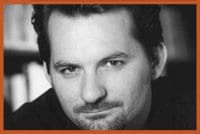Apocalypse à Kamloops is just as it sounds; the end of the world is nigh in present-day BC, and the main character of the play, Jocelyn, is visited by a muse. This muse tells Jocelyn that he must work out his issues with his materialistic family in less than 24 hours (before the world is obliterated), and karma has its turn with him.
The play is being presented by Théatre la Catapulte at La Nouvelle Scène, and includes in its ensemble two Ottawa-area actors, Annie Lefebvre and Pierre Simpson.
“It’s set present-day, after the gay movement, like today or tomorrow in Kamloops. The play is really about how we can find happiness within the family unit,” says director Joël Beddows.
Writer Stephan Cloutier uses this seemingly bleak backdrop as an ironic setting for his queer-themed comedy. The main character is gay and his sister discovers that she is a lesbian through the course of the show. Beddows says that the play is a very human portrayal of the gay characters dealing with familial issues. Jocelyn is struggling with his callousness toward his father while his sister deals with the consequences of her aggressive nature and the fact that she just doesn’t listen.
“Personally, I recognized a lot of lines in this play. I could remember thinking or saying certain parts in the script. I’m gay myself and I recognize the type of family communication in the play, or lack thereof. The appeal of the play is quite wide,” says Beddows.
He adds that queer allies like friends and family members would also get a lot out of the “healthy perspective” of sexual identity in Apocalypse à Kamloops. Beddows emphasizes that the play is about finding a balance in your life regardless of identity.
“Because it’s not by hiding in a shell that you’re going to find happiness,” says Beddows.
Despite the imminent apocalypse, Beddows stresses that there is no religious element in the play; the muse is sent from a “higher power.”
But Beddows believes that the play exemplifies some of the valuable religious elements that have more or less been forgotten.
“When we got rid of Catholicism, we threw out the church ceremony, community, and the concept of the traditional family. But we made a mistake and threw out some good things too, like communication, tolerance, and the family as a support system. This play attempts to bring these elements into focus,” says Beddows.
The unique sound element of the play oozes cool. Sound director, Antoine Bédard went all out to create a soundtrack that underscores Jocelyn’s materialistic family. While transferring between scenes in the play, an eclectic mix of tunes spurs on the action, such as classy French café standards and rich, contemporary québécois tracks.
The set design also mirrors Jocelyn’s spendthrift family. All of the furniture on the stage is painted black.
“There’s a car and a telephone… it’s everything in life that they’ve accumulated that has not made them happy,” says Beddows.
The director also says that the play is a really “uncomplicated” show that would be perfect for gay teenagers. And don’t worry if your French is shaky, or even non-existent. Théatre La Catapulte is willing to send you an English copy of the script by e-mail.

 Why you can trust Xtra
Why you can trust Xtra


